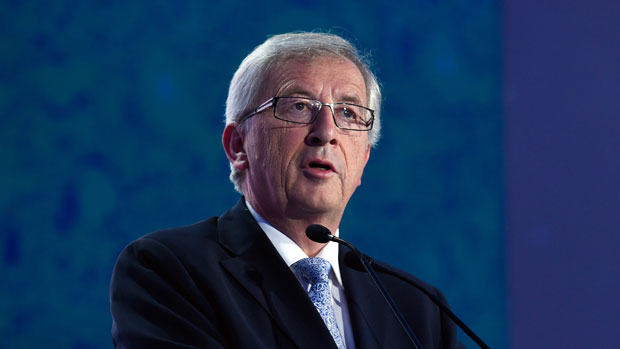Brexit: Britain will regret leaving the EU, warns Juncker
‘Optimistic’ speech includes call for EU trade deals with Australia, New Zealand

A free daily email with the biggest news stories of the day – and the best features from TheWeek.com
You are now subscribed
Your newsletter sign-up was successful
European Commission President Jean-Claude Juncker gave his annual State of the Union address today - and warned that Britain will regret leaving the European Union as the 27 other EU members “move on”.
Compared to last year’s speech - which, if anything, “was a call to stop the collapse of the EU” - this year’s address “struck a far more optimistic note, as Juncker praised the bloc’s achievements over the last 12 months and laid out his vision for the bloc’s future”, says Deutsche-Welle.
Addressing the UK directly, Juncker said that “we will always regret this, and I think you will regret this too, soon.
The Week
Escape your echo chamber. Get the facts behind the news, plus analysis from multiple perspectives.

Sign up for The Week's Free Newsletters
From our morning news briefing to a weekly Good News Newsletter, get the best of The Week delivered directly to your inbox.
From our morning news briefing to a weekly Good News Newsletter, get the best of The Week delivered directly to your inbox.
“We will move on, because Brexit isn't everything. It isn’t the future of Europe - it’s not the be-all and end-all.”
Juncker said the EU had made economic strides in the past year. But he called for the union “to seize the momentum and agree new trade deals”, reports the BBC.
Free trade talks
Juncker urged EU governments to give his commission, the EU’s executive arm, the authority to begin free-trade negotiations with Australia and New Zealand. His plan comes on the heels of a provisional EU accord with Japan and a week before a hard-fought European deal with Canada enters into force.
A free daily email with the biggest news stories of the day – and the best features from TheWeek.com
Juncker said the commission would aim to conclude talks with Mexico and the South American trading bloc Mercosur, led by Brazil and Argentina, by the end of the year.
The outreach to Australia and New Zealand “will offer a fresh reminder of the EU’s global market-opening clout, further distance Europe from US President Donald Trump’s protectionist tilt and raise awkward questions for Theresa May”, says Bloomberg.
May wants the UK to cut and paste EU trade deals post-Brexit, but “will be unable to strike her own commercial pacts until after the UK quits the bloc in March 2019”, the website adds.
'Wind in the sails'
“A veteran of dealmaking through decades of fractious European Union politics”, says Reuters, Juncker has “often despaired at the bloc”.
But in today’s speech he said he saw it bouncing back, a decade after the global financial meltdown.
Juncker “painted a bright picture for the future of the EU”, says The Independent.
“The wind is back in Europe’s sails,” Juncker told the European Parliament, citing faster economic growth in the EU than in the US.
“Now we have a window of opportunity, but it will not stay open for ever. Let us make the most of the moment: catch the wind in our sails.”
Brexit talks postponed
The annual address came hours after the UK and EU agreed to postpone the next round of Brexit talks, which were due to take place next week.
A British government spokesperson said the delay was to allow more time for “consultation”, but the European Parliament’s Brexit lead negotiator, Guy Verhofstadt, claimed Theresa May is set to make an intervention regarding the UK’s position.
-
 What are the best investments for beginners?
What are the best investments for beginners?The Explainer Stocks and ETFs and bonds, oh my
-
 What to know before filing your own taxes for the first time
What to know before filing your own taxes for the first timethe explainer Tackle this financial milestone with confidence
-
 The biggest box office flops of the 21st century
The biggest box office flops of the 21st centuryin depth Unnecessary remakes and turgid, expensive CGI-fests highlight this list of these most notorious box-office losers
-
 Epstein files topple law CEO, roil UK government
Epstein files topple law CEO, roil UK governmentSpeed Read Peter Mandelson, Britain’s former ambassador to the US, is caught up in the scandal
-
 Iran and US prepare to meet after skirmishes
Iran and US prepare to meet after skirmishesSpeed Read The incident comes amid heightened tensions in the Middle East
-
 Grok in the crosshairs as EU launches deepfake porn probe
Grok in the crosshairs as EU launches deepfake porn probeIN THE SPOTLIGHT The European Union has officially begun investigating Elon Musk’s proprietary AI, as regulators zero in on Grok’s porn problem and its impact continent-wide
-
 Israel retrieves final hostage’s body from Gaza
Israel retrieves final hostage’s body from GazaSpeed Read The 24-year-old police officer was killed during the initial Hamas attack
-
 China’s Xi targets top general in growing purge
China’s Xi targets top general in growing purgeSpeed Read Zhang Youxia is being investigated over ‘grave violations’ of the law
-
 Panama and Canada are negotiating over a crucial copper mine
Panama and Canada are negotiating over a crucial copper mineIn the Spotlight Panama is set to make a final decision on the mine this summer
-
 Europe moves troops to Greenland as Trump fixates
Europe moves troops to Greenland as Trump fixatesSpeed Read Foreign ministers of Greenland and Denmark met at the White House yesterday
-
 Why Greenland’s natural resources are nearly impossible to mine
Why Greenland’s natural resources are nearly impossible to mineThe Explainer The country’s natural landscape makes the task extremely difficult